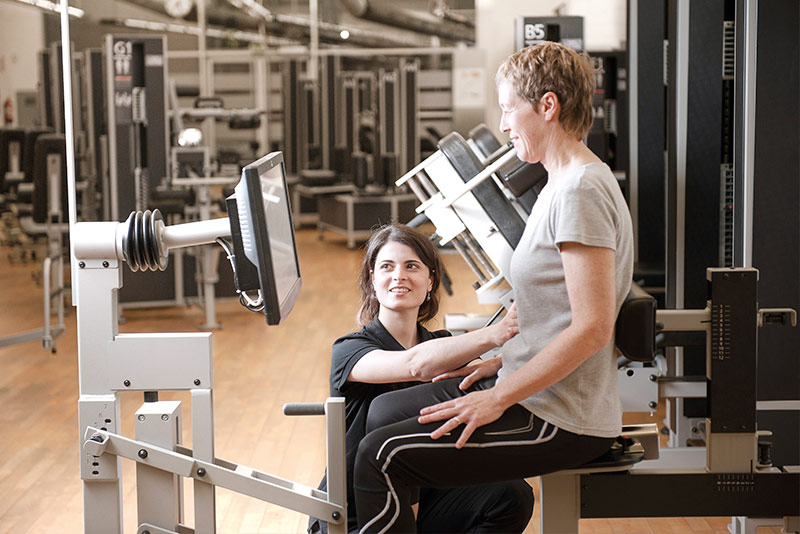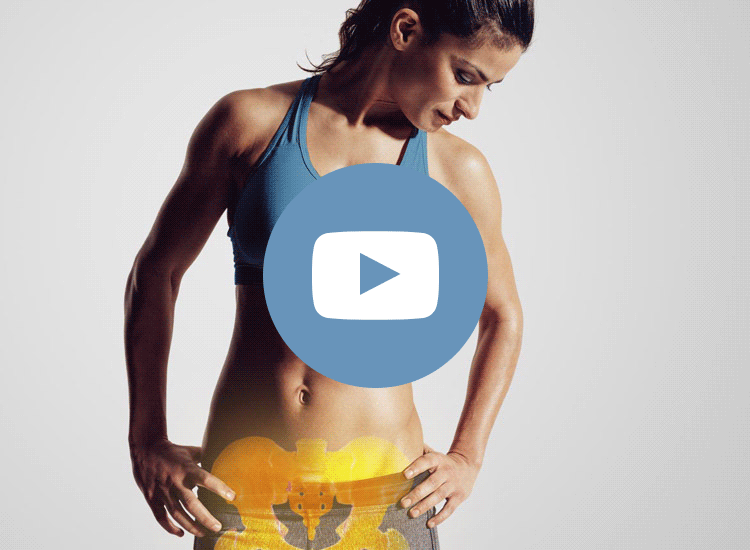Physiotherapy exercises for the pelvic floor
The importance of looking after your pelvic floor
At present, 50% of all women aged between 20 and 50 have experienced urinary incontinence when making a physical effort such as jumping, sneezing or laughing. In most cases, this urinary incontinence is due to a weakening of the pelvic floor muscles. In women, pregnancy and childbirth are the main causes of this weakening of the pelvic floor. In men, these problems often appear with age, especially after 50.
Other risk factors for the appearance of urinary incontinence are: frequently remaining seated for hours, a minimum level of physical activity, or prostate, bladder or intestine operations.
Training the pelvic floor is a very effective way of solving or minimising this type of urinary incontinence, as well as being very important in other aspects of everyday life. If you are looking for effective pelvic floor exercises, Wunder Training offers a unique method for strengthening and recovering the area with measurable results right from day one.
Our pelvic floor rehabilitation programmes
We offer two types of programme to strengthen and recover the pelvic floor:
Pelvic Floor Programme:
A full Wunder Training training programme that includes specific strengthening of the pelvic floor with our A5 machine, as well as the usual strengthen, resistance and flexibility work.
Pelvic Floor Programme + Specialist Physiotherapy:
Private 60-minute sessions with a physiotherapist who specialises in the pelvic floor. These sessions combine pelvic floor physiotherapy techniques and supervised training on our A5 machine. The sessions are booked in advance and are paid per session.
The pelvic floor physiotherapy techniques we use are:
- Manual therapy and/or perineal massage.
- Electrostimulation and/or intracavitary biofeedback.
- Percutaneous tibia neuromodulation (incontinence).
- Hypopressive Abdominal and Kegel Exercises.
- Vaginal/rectal examination.
- Voiding diary to normalise function.
A5. Our exclusive machine to strengthen the pelvic floor
Wunder Training has a machine capable of independently training and strengthening the pelvic floor muscles. This machine works the muscle group in question and avoids confusion with other auxiliary muscles (gluteus, abdominal, adductor).
The central part of the pelvic floor machine is a pressure sensor fitted horizontally on the surface of the seat, which detects muscle contraction intensity. Thanks to the monitor connected to the machine, it is possible to control the intensity of the exercise and measure the results obtained.
This is a discreet, non-invasive method to strengthen the pelvic floor that is designed for individual use.
The exclusive, patented technology of the pelvic floor machine provides:
- Training focused on the pelvic floor.
- An indication to users whether tension and relaxation are being applied in the correct place and to what degree.
- A measurement of the training progress shown in graph form.

Benefits of pelvic floor therapy
Benefits such as the following are obtained thanks to the specialist physiotherapy and muscle training for the pelvic floor:
- Stabilising of the torso and improved posture.
- Elimination or decrease in urinary or intestinal incontinence.
- Increased sensitivity during sexual intercourse.
- Stable internal abdominal organs and a reduced risk of a prolapse.
- In women, a reduction in the effects of a premature weakening of the pelvic floor and preparation of the pelvic floor for pregnancy and childbirth.
- In men, mitigation of erectile dysfunction and recovering strength after a prostate or abdominal operation.
Suitability of pelvic floor physiotherapy
Pelvic floor physiotherapy is suitable for people suffering from:
- Prolapses: cystocele (prolapsed bladder), rectocele (prolapsed rectum), uterine prolapses (type 1 and type 2).
- Urinary incontinence: stress, urge, or mixed.
- Pregnancy and Postpartum.
- Faecal Incontinence.
- Vaginal or rectal hypo/hypertonia.
- Post Prostatectomy Surgery.
- Male and female sexual dysfunctions: dyspareunia, vaginismus, lack of sensitivity, premature ejaculation and erectile dysfunction.
VISIT WUNDER TRAINING
C/Muntaner 529 – Barcelona
T. 93 418 47 2093 418 47 20
info@wundertraining.com
OPENING HOURS:
Monday to Friday, 07:00 – 22:00
Saturday, Sunday and bank holidays, 09:00 – 15:00


